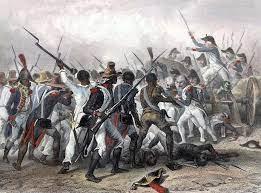
Battle of Vertières (1803, Haiti)
Share
The Haitian Revolution (1791-1804) was a triumphant slave uprising that established Haiti as the first independent Black republic. Led by Toussaint Louverture, the revolution shattered slavery, inspired global struggles for freedom, and challenged colonial powers. Despite facing adversity, the revolutionaries declared independence in 1804. Defeating both French wnd British Forces Independently in Battle, 2 key Super Powers in the world at the time and in the Transatlantic Slave Trade. Marking a turning point in both the political landscape of slavery but also the consciousness of African slaves and Colonized Countries around the world.

The Haitian Revolution remains a symbol of resistance and a catalyst for human rights movements. The Battle of Vertières was a historic engagement that marked the culmination of the Haitian Revolution. Fought on November 18, 1803, it pitted the Haitian revolutionary forces, led by General Jean-Jacques Dessalines, against the French army. The battle's outcome sealed Haiti's independence, making it the first independent Black republic in the world.


The Haitian revolutionaries, comprising formerly enslaved Africans, fought against the brutalities of slavery and the oppressive French colonial regime.

The Battle of Vertières saw the disciplined Haitian forces launch a decisive assault, forcing the French to retreat and leading to the establishment of Haiti as a sovereign nation.
The Battle of Vertières stands as a testament to the indomitable Mowan spirit of the Haitian people and their unwavering commitment to freedom.
Formerly enslaved Africans who fled to remote mountainous areas were called marron (French) or mawon (Haitian Creole), meaning 'escaped slave'. The maroons formed close-knit communities that practised small-scale agriculture and hunting. They were known to return to plantations to free family members and friends.

Multiple hatian leaders in the early embers of the uprising were deported.
Nanny of the Maroons being one of them who also went on to lead uprisings in the Jamaica and others also fid so in the country's they were deported.
It serves as an inspiration for struggles against oppression worldwide, highlighting the power of unity and determination in the face of adversity.
